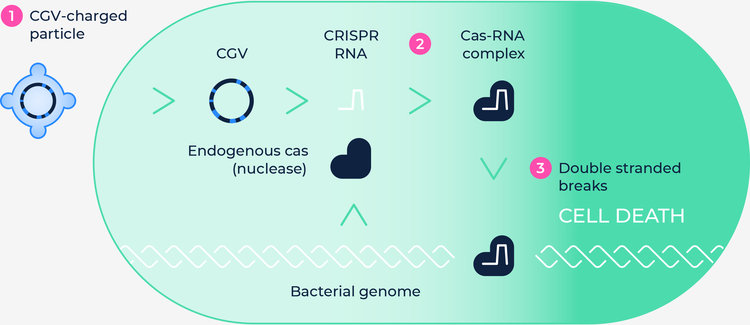
AMR: Snipr Biome Aps raises €43m to programme pathogens for death
Copenhagen-based SNIPR BIOME Aps raised €43m in a series A financing led by seed investor Lundbeckfonden Emerge (Copenhagen) and LSP and co-financed by North-East Family Office (Copenhagen) and Wellington Partners (Munich).
The company utilizes the natural bacterial CRISPR-based adaptive immune system in a programmable fashion to kill target bacteria based on their specific genomes. SNIPR BIOME’s orally administered DNA-based CRISPR-Guided Vector (CGV) particles activate the endogenous bacterial Cas enzymes to cause double-stranded breaks at specific sites of the bacterial genome and selectively kill bacterial pathogens while leaving commensals intact.
SNIPR BIOME said it will use the assets to push development of two preclinical programmes that use CGVs to target antibiotic-resistant bugs and to modulate the composition of the gut microbiome in order to prevent autoimmune diseases. The company aims to start clinical trials in the first programme in two years from now.
Dr. Christian Grøndahl, Co-founder & CEO, commented: We have the potential to develop valuable therapeutics within multiple important disease areas. We will focus initially on precision medicines for difficult-to-treat infections and precision microbiome modulation in auto-immunity and cancer. We are utilizing the bacteria’s CRISPR/Cas immune system to selectively kill target bacteria based on specific DNA fingerprints.
Upon the financing, LSP Managing Partner Dr. Joachim Rothe and Dr. Regina Hodits, Managing Partner at Wellington Partners entered the Board of SNIPR BIOME , which is chaired by Dr. Christian Elling, Managing Partner of Lundbeckfonden Emerge, as Directors.
Three years ago, a research team from Israel reported in PNAS they have used phages for delivering a programmable Cas nuclease, to reverse antibiotic resistance and eliminate the transfer of resistance between strains. In January, Janssen Biotech paid Locus Biosciences US$20m upfront in a potential $818m licence deal aimed at commercialising Locus CRISPR-Cas3 technology to target two bacterial pathogens.
Novel technologies that target antimicrobial resistance will be in the focus of a start-up pitch at the 12th Berlin Conference on Life Sciences: "Novel Antimicrobials and AMR Diagnostics 2019". More than 350 international experts will meet at the end of this week to discuss novel AMR funding initiatives, payment models to incentivise R&D, regulatory issues, clinical trial designs and technologies. For programme and list of speakers please follow this link.



 adobe.stock.com - ipopba
adobe.stock.com - ipopba BioDlink
BioDlink